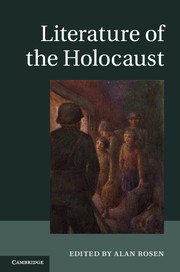Book contents
- Frontmatter
- Contents
- Notes on contributors
- Acknowledgments
- Introduction
- Part I Wartime victim writing
- Part II Postwar responses
- Chapter 3 The Holocaust and Italian literature
- Chapter 4 German literature and the Holocaust
- Chapter 5 Hebrew literature of the Holocaust
- Chapter 6 The Holocaust and postwar Yiddish literature
- Chapter 7 The Holocaust in Russian literature
- Chapter 8 The Holocaust in English-language literatures
- Chapter 9 Polish literature on the Holocaust
- Chapter 10 Hungarian Holocaust literature
- Chapter 11 French literature and the Holocaust
- Part III Other approaches
- Guide to further reading
- Index
- References
Chapter 3 - The Holocaust and Italian literature
Published online by Cambridge University Press: 05 June 2014
- Frontmatter
- Contents
- Notes on contributors
- Acknowledgments
- Introduction
- Part I Wartime victim writing
- Part II Postwar responses
- Chapter 3 The Holocaust and Italian literature
- Chapter 4 German literature and the Holocaust
- Chapter 5 Hebrew literature of the Holocaust
- Chapter 6 The Holocaust and postwar Yiddish literature
- Chapter 7 The Holocaust in Russian literature
- Chapter 8 The Holocaust in English-language literatures
- Chapter 9 Polish literature on the Holocaust
- Chapter 10 Hungarian Holocaust literature
- Chapter 11 French literature and the Holocaust
- Part III Other approaches
- Guide to further reading
- Index
- References
Summary
Any “national” literature of the Holocaust must necessarily confront not only intensely challenging universal questions to do with the darkest sides of human nature and human history, not only the millennial history of racial difference and the persecution of the Jews, but also a panoply of “local” questions, of circumstance and immediate cause, of politics and individual choice, of family, community, town, and nation. The Italian case is no exception to this rule.
Fascist Italy was the model and prime ally for Nazi Germany. Even if its racial politics were less predominant than Germany’s, its anti-Semitic Racial Laws of 1938, its colonial and anti-Slav violence, its aid with roundups and deportations after 1943 all point to a profound degree of complicity with genocide. And yet there is also a powerful counternarrative to Italy’s Holocaust, an array of delays, blockages, and obstacles Italians put in the way of the Final Solution, of heroic attempts by decent Italians to protect Jews and other victims. Furthermore, Italy – like Austria, France, and others – also has a narrative of “occupation” to set alongside its complicity, since during 1943–1945, when all deportations of Jews from Italy took place, large parts of the country were under de facto Nazi occupation. Something close to civil war ensued, during which the Nazis carried out deportations and dozens of civilian massacres, leaving devastating legacies of mourning and conflicted memory.
- Type
- Chapter
- Information
- Literature of the Holocaust , pp. 51 - 67Publisher: Cambridge University PressPrint publication year: 2013



